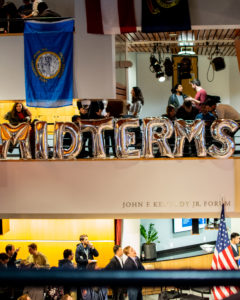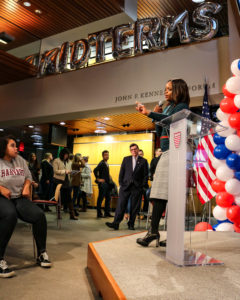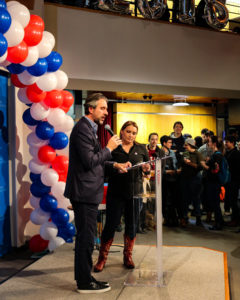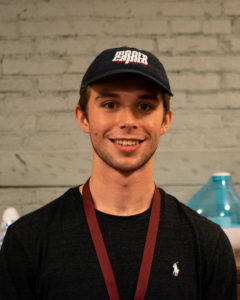
Photo by Lindsey Bouldin
At the election watch party at the Institute of Politics, the atmosphere was brimming with chatter and excitement. All around the room, students and politically active citizens were glued to their laptop screens and the screens of the large televisions on the wall. The flags of all America’s states were on the walls, and there were even balloons that spelled out “Midterm 2018” in their silvery plastic. In the midst of the anticipation, I asked people in attendance of watch parties their thoughts, feelings, and emotions in relation to the election. Note that these responses were recorded the night of November 6th and some opinions of the interviewees may not reflect the results of the election.



Photos by DJ Kranchalk
Preceding the election results, the Institute hosted a number of speakers, including politicians, commentators, and journalists.

Photo by Lindsey Bouldin
Starr Rhee, a sophomore at Harvard College, has always been politically active, whether that be participating in high school civic clubs or volunteering for local candidates. I caught up with her at a Tennessee Election Watch Party she threw, and when asked about specific races she was watching, this is what she responded:
“There are two major races I’m watching. The first is the Tennessee senate race with Phil Bredesen and Marsha Blackburn. For the first time in a while, Tennessee actually has a competitive race in the senate, which is pretty exciting, and I spent this summer working on a Democratic campaign in Tennessee, so I’ll be really interested in if Phil Bredesen can gain some ground there. Typically we elect moderates, and Marsha Blackburn is not as moderate, so we will see if despite our Republican tendencies, we go blue this time. The second race that I’m really invested in is Stacey Abrams gubernatorial race in Georgia. I think she’s a really exciting candidate with a lot of potential to potentially run for higher office in the future. I want her to be president, and I also think she’s running an exciting grassroots campaign. If she wins, that’s going to be awesome for the Democrats in the south.”

Photo by Lindsey Bouldin
The IOP Election Watch party drew people from all over Cambridge and Boston, even outside of the Harvard sphere. Tushar Kunda was one of these people, and is actually from California working for the National Bureau of Economics. I asked him why this election was important to him, and he also discusses the effects this election could have on America.
“This election is important because two years ago because the election with Trump was really depressing. I was in college at the time, and the day after the election was complete devastation, so this is important as the first chance people get to really make their voices heard after that election. It’ll be really interesting to see, depending on the results, what the impact will be. So if Democrats lose, I’m very curious to see how that shakes people’s faith in the system, and even if they win, it’ll be interesting to see that they need an 8 or 9 percentage victory in the popular vote in order to pull out a narrow margin in the house. I’ll be most interested to see how people’s faith in democracy emerges out of this election, and it’s important because it’s the first chance people get to comment on what has been going on in the past two years.”

Photo by Lindsey Bouldin
Gabe is another Harvard outsider who was attracted to the Institute of Politics in order to watch the election. When asked about his reasons for voting, the medical student from Oregon said,
“I really believe voting is what defines us as Americans, and I find it really hard to complain about the political climate if you’re not making the political change for yourself. Personally I think that every American has a responsibility to vote, and I find we spend a lot of time talking about rights, but not enough time talking about responsibilities, and that I believe is one.”

Photo by Lindsey Bouldin
Similar to Starr Rhee, Atticus Hatfield is another student from a historically red state. As a West Virginian native, the Harvard College freshman has a lot of interest in watching his state’s House and Senate races.
“The Beto O’ Rourke/Ted Cruz race has gotten lots of national attention, and it would be pretty crazy to see Texas swing blue. It wouldn’t be so surprising to see Ted Cruz lose this race if it weren’t to such a solid Democratic candidate as Beto O’ Rourke, so that is interesting. Same with Florida for similar reasons. Andrew Gillum is pretty far to the left of Rick Scott, so that would be a pretty broad policy swing in their governorship. In [West Virginia] Richard Ojeda, [he] has received some national press. He’s sort of like a Bernie Sanders, Trump mix in that he’s sort of a crude, rough ‘n tumble, Logan county, “I’m a hillbilly” West Virginian, but he’s also… refused to take money from any lobbyists, and he says he’s going to take on big, big corporations and things like that, so that’s an interesting race… Also [West Virginia], Joe Manchin versus Patrick Morrisey, Trump won West Virginia by 45 points in 2016, and Joe Manchin was, his Senate seat was considered doomed at that point because West Virginia was swinging so red, but lately polls had Manchin ahead.”

Photos by DJ Kranchalk
Viewers wait anxiously (and some wait eagerly) watching the large television screen as results pour in from across the country.
This photo essay was compiled and written by HPR multimedia staffers Lindsey Bouldin and DJ Kranchalk.
